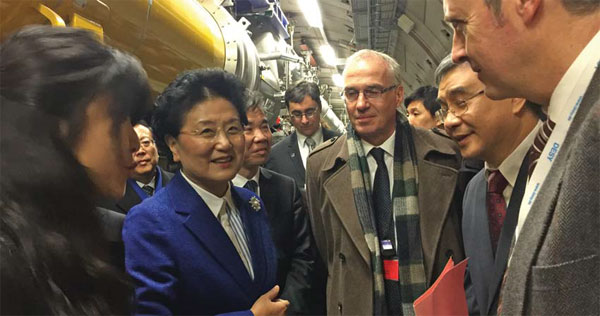Schroder: Germany should stay open
Former German chancellor Gerhard Schroder says that Germany should not become "defensive" in attracting Chinese investment, which would be essential for job creation in the country's export-dominated economy.
The former chancellor joined business leaders in calling on China and EU to speed up various efforts, including investment talks, to contribute to global growth and development against rising uncertainties worldwide.
"Germany should therefore not take a defensive approach to Chinese investment in our economy," said Schroder, addressing the two-day Hamburg Summit, which started on Nov 23, with the theme "China Meets Europe".
Chinese Vice-Premier Liu Yandong visited a high-tech research facility on Nov 24 and she called to promote science, education, culture and sports exchanges between the two countries.
|
Visiting Vice-Premier Liu Yandong has urged more science and technology cooperation between China and Germany, which she calls a scientific powerhouse, when she visited European high-tech research facility XFEL in Hamburg on Nov 24. Fu Jing / China Daily |
"The German economy wishes not only to sell its products in world markets but also to create local jobs and training opportunities," Schroder said.
He said Germans have become well aware that investment and openness are the elements that drive the German economy forward.
"Without them, we cannot advance," Schroder said. "This is because the German economy is dependent not only on foreign investment but also on foreign knowledge and know-how."
Regulatory institutions in Germany and Europe generally recently tightened their approval procedures when dealing with increased Chinese investment. Schroder was among a handful of European leaders in previous years who built strategic partnerships between China and Germany and between China and the EU.
At the opening of the forum, the former chancellor received the China-Europe Friendship Award in recognition of his outstanding achievements in cultivating relations with China.
Fritz Horst Melsheimer, president of the Hamburg Chamber of Commerce, called for an investment treaty between the EU and China to be agreed upon as soon as possible in the coming year to put bilateral economic relations swiftly onto a more solid legal foundation.
"The Sino-EU investment agreement is essential for EU-China relations to reach their full potential. And we do hope that the agreement will be concluded in 2017," Melsheimer said.
Melsheimer said China's economic slowdown, stagnation in many European countries and United Kingdom's vote for Brexit are pressing challenges that will affect the bilateral economic relations between China and the European Union.
Facing such difficulties, Schroder said China and Germany have a special responsibility to respond.
"The efforts will determine the direction which the globalized world will take, politically and economically," he said.
Schroder has urged more open dialogue between Europe and China to improve economic relations and mutual understanding.
Li Yizhong, chairman of the China Federation of Industrial Economics expressed his confidence in the continuous boosting of bilateral trade and investment flow.
"Many figures have shown that foreign investors are strongly confident in China's investment environment and economic prospects," said Li, noting that total direct investment from 28 EU countries surpassed $7 billion (6.6 billion euros; 5.6 billion) during the January-August period this year, a 48.7 percent year-on-year increase.
"I also hope we could wrap up the ongoing investment talks as soon as possible to further facilitate bilateral investment activity," Li said.
fujing@chinadaily.com



















